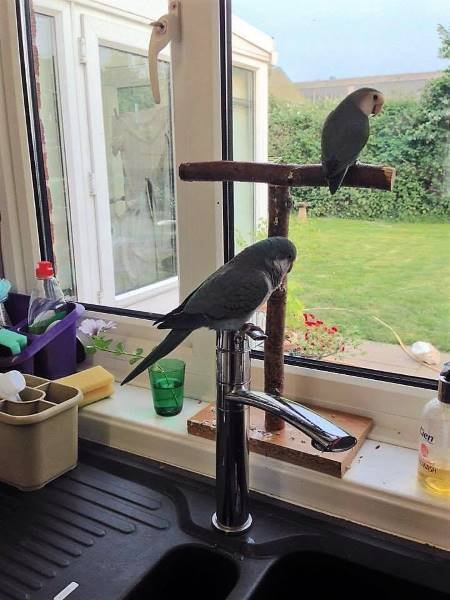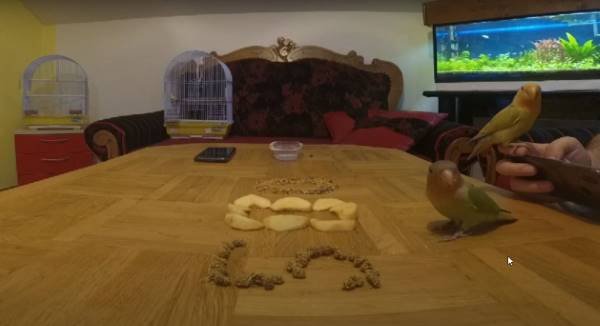Adopting a pet not only brings the responsibility of raising them right but also protecting them lifelong. This is because they are like a toddler all their lives and trust their human companions for their care. And many times, we fail them miserably. Connect to any parrot forum and one will hear multiple incidents of somebody or the other losing his parrot while he took the bird out for some sunshine. So, the first horror that haunts us all is: Will an escaped parrot survive in the wild?
Can Escaped Parrots survive?
The chances of an escaped parrot surviving in the wild are meek. This is because of their inability to:
- Fly high and away in case any predatory bird as hawk or owl attacks him. Also, they aren’t as good flyers as their wild counterparts.
- Find food and water sources to survive in the wild. The pet parrots aren’t trained like wild parrots to feed themselves.
- Adapt well to the areas that they aren’t native to. We all know that parrots are meant to live only in certain regions/climates like tropical or warm. If a parrot has been adopted in a colder region and happens to escape, he may not keep himself alive for long.
- Find what places are best for him to nest in the night. What if he happens to stay next to a hawk’s nest or fox’s den?
- To adjust to the new environment. Pet parrots are used to the love and care of their human companion. Not having it at all makes them fall into depression. This is the reason why most of the escaped parrots are traumatized and depressed when they are later rescued. If they are left in the wild they might succumb to depression and associating illnesses.
That said, survival cannot be ruled out completely. If the parrot is not too young, he might find out ways to survive in the wild. And the chances increase if the parrot is smarter too.
Can Parrots Find Their Way Home?
It is not uncommon for parrots to find their way back home. Many of the lost pet parrots are reported to head within three days of flying away with some returning after the sunset. But this becomes a reality only if the parrot had been happy in his aviary and tamed extremely well.
- When in the wild, parrots usually cover approximately 30 miles a day. And when it comes to pet parrots, they aren’t accustomed to fly that far. So, there are always chances of them heading back home looking for their human flock members. Make it easier for them to locate you while you search.
- A fully-tamed parrot always prefers human company than flying out with the wild birds. So, there are always chances that an escaped parrot visits nearby homes for food and love. And if he’s nearby, the probability is the highest of him ending up in his home only.
What to do to Recover a Lost Bird?
Recovering a parrot that has flown away is undoubtedly a daunting and almost impossible task. But with quick action and smart search techniques, many parrot parents have tasted success in having their feathery friends back home. Remember that the first 24 hours are extremely crucial to find a lost parrot since he cannot fly far away in such a short period.
- Looking for the bird while calling out his name or making his favorite noise such as whistling. A well-tamed parrot responds immediately on hearing his owner’s voice.
- Carry your bird’s travel cage with his favorite treat kept inside to safely bring him back home. Such a cage carrying the treat shall also be kept in your garden to cover the case of your lost parrot returning home by himself.
- Playing the recorded voice of a parrot on your phone while searching for the lost one will help call him back. Your parrot is familiar with these sounds and might be drawn towards them.
- Searching the parrot around the nearby trees when the sun is setting will increase your chances of finding him out. Birds tend to settle down on trees when the night approaches.
- If your parrot has a companion, placing the companion’s cage in your garden or taking it along while recovering a lost parrot will increase the chances of finding the lost bird. The contact calls of the companion will show the right direction to the lost parrot.
- Engage the neighbors by creating flyers and giving other physical details that could help recognize the parrot. But do not reveal the leg band number of the bird to anyone as the ‘Finders-Keepers’ kind of people might erase such proofs to have a tamed bird by themselves.
- Contact all the vets, bird clubs, bird stores, police stations, radio/television shows, or any such parrot forum to spread the word and information about the missing bird. To ensure that the efforts reap a positive result, offer a reward for anybody finding the bird.
- Contacting the wildlife rescue organizations in your area might also help. Since there are many birds with these organizations, the lost bird might hear familiar sounds and land up in the rescue center.
- Posting an online advertisement on specialized forums like Parrot Alert will spread the word further. If someone has rescued your pet parrot, he might look for an advert online to find you. So, an online posting on several such websites as well as bird groups on Facebook can be useful as well.
Summing Up
Time plays the most significant role when it comes to finding a lost parrot. Get into action as soon as you discover your beloved pet is missing. He must not have flown much as a pet bird isn’t used to taking long flights quickly. As the search starts, keep communicating with your little birdie as parrots have been scientifically proven to possess telepathic abilities with their loved ones. If the bird is closer home, they might pick on his companion’s thoughts and use it as a guiding light for his home.




